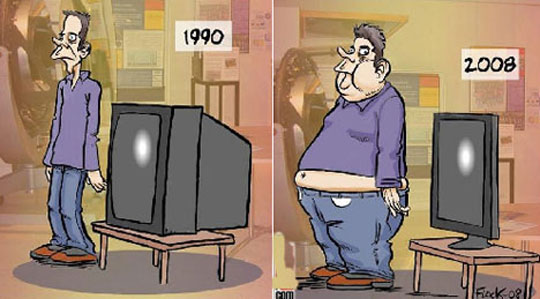Dear Brothers and Sisters in Christ,
I can relate to the cartoon above (used with permission). I am a moderate gadget person. I enjoy my smart phone and am slightly envious of my wife’s sleek flat screen television in her craft room. But I still hold on to the old-fashioned tube kind in my den.
Technology is changing the lives of even the most technologically challenged of us. If only we could make the same kind of progress with war, or poverty, or hunger and disease. Even developed nations seem to be in danger of economic collapse these days. Experts in international politics and finances disagree about the seriousness of the situation. Some see peace on the horizon and an economic recovery. Others warn us that things could get worse before they get better.
It is, then, not surprising that there are many people who think we are on the edge of disaster, and that the world is coming to an end.
I don’t pretend to be an expert in international finances or politics. I have no inside knowledge about what is going to happen. What I do know is that I have heard dire warnings of catastrophe “just around the corner” all my life. These warnings were not from experts, based on experience or a careful analysis of the situation. They were based on a wrong understanding of Bible prophecy. Doomsaying like this did serve to create a certain climate of urgency about “preaching the gospel as a witness before the end came.” At least, it did for a time. But in the long run, I see that it also created what I call a “prediction addiction.”
Here is what happens. You conclude from your study of prophecy and its chronological calculations that we are in the “end times,” and that a catastrophe of “biblical proportions” is going to befall us in “just a few short years” (they are always “short” years, it seems). You then “watch and pray,” anxiously (or perhaps eagerly), fitting the events and news of the day into your predetermined framework. You watch with growing anticipation as the evidence piles up.
The problem is that the pile of evidence starts to get very shaky, and the “short years” stretch into decades. Although the pattern of major world events may not fit neatly into your prophetic scenarios, you can still find enough catastrophes to stay in the game, while you hastily recalibrate your prophetic timetable.
Thankfully, as we in GCI have moved into the full embrace of grace, we have come to understand prophecy in a different light – the light of Jesus. It is his light and life that deliver us out of prediction addiction.
Of course, this doesn’t mean that we look at the state of the world through rose-colored glasses.When we look at world history, we see a cycle of corruption, greed and egomania that has resulted in financial crises, starvation and war. History does have a way of repeating itself. One thing is consistent – we human beings do not know the way to peace. In spite of our progress in technology, far too many of the world’s citizens live in poverty, sickness and fear. Indeed, we need help of biblical proportions.
Most of the self-appointed prophets who so enthusiastically plot the end time do at least have one thing right. The solution is for Jesus to return and establish the kingdom of God, as he promised he would. But he did not say when, and he made it clear that it was a waste of time trying to figure it out.
Jesus’ prophetic word announced the mustard seed presence of the kingdom of God and the promise of it one day arriving in fullness when he himself would return. He opened up the way for us to accept his rulership in our lives now and, in effect, change sides. While remaining in what the Bible so accurately calls “this present, evil world,” we can by God’s grace, live our lives now in a way that represents the very kingdom of God. Although not now fully manifested and often hidden, our trust in the coming of our Lord’s kingdom means we are to be people of hope, not doom.
Our role is to show how anyone can have that life now, through a personal relationship with Jesus and his Father by the Holy Spirit—a life that God offers to everyone. Our part is to be living parables—those who embody signs of that coming kingdom. We are to speak and act in faith, and love and hope—at home, in our churches, at our jobs, in our nations.
So we don’t need to waste our time frantically trying to find meaning in the next cycle of world disruptions. Jesus said these would continue until he returns, whether that is one, or ten or a thousand years from now. It does not change what we can enjoy now in our relationship with Jesus. He has already secured our future. He holds out to us the hope of a new heaven and earth. He is the First One, the Protos, and the Last One, the Eschatos (Rev. 22:13). Jesus Christ, our Reconciler and Redeemer, is the Living Word of God and he will have the last word.
So I consider myself a recovering prediction addiction addict. I have stopped looking to world events to serve as my spiritual barometer and only look to Jesus who is the author and finisher of our faith.
In him,
Joseph Tkach



